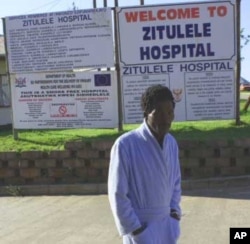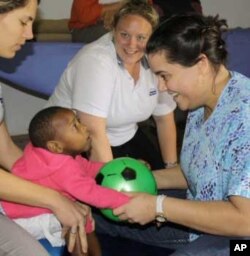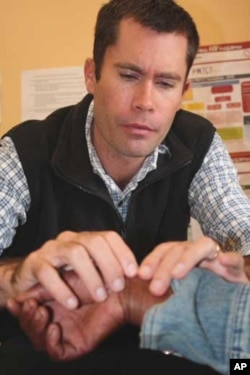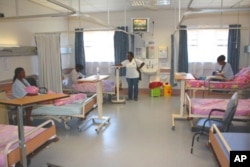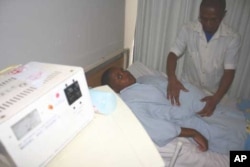This is Part Two of a five-part series on health care in South Africa’s Eastern Cape province
Continue to Parts: 1 / 2 / 3 / 4 / 5
His skin was charred and peeling; his blistered flesh burning constantly. When he could muster some energy, the 14 year old boy screamed in agony. Mostly, though, he had only enough strength to moan in quiet desperation, and to blink away the ever-present tears that filled his large brown eyes.
“He was burnt in a hut fire. He had significant burns, about 40 percent burns, and he was lying in the hospital getting dressings every day, and just slowly wasting away; the hospital diet is not always rich in protein and nutrients,” recalled Dr. Liz Gatley, at Zithulele Hospital in South Africa’s Eastern Cape province.
As days became months, hope for her young patient faded. “He was dying. He just got thinner and thinner and more anemic,” the rural health specialist said.
But Gatley wasn’t prepared to surrender another life to the harsh conditions under which the people of Oliver Tambo District, one of the country’s most isolated and poorest areas, live.
“I decided to start investing in a high-protein diet for him,” she said. The hospital couldn’t afford meat for patients, so the physician bought it herself. For six weeks, three times a week, she cooked meat and fed it to the ailing burn victim.
“He survived, in the end. I couldn’t believe it. He stayed well enough to be able to be transferred to another hospital for a skin graft, which is what he really needed,” Gatley said.
She recently saw the boy for the first time in six months. “He walked through the hospital door the one day. I couldn’t believe it; he looked really chubby, actually. I saw his scar; it was nicely healed and he was absolutely fine. It was amazing,” she told VOA, laughing.
‘Go in alive; come out dead’
Gatley’s story is further proof of a remarkable transformation that’s happened at Zithulele Hospital. Five years ago, said community health worker Ncedisa Paul, the facility was “very far away” from being a place of compassion and the “oasis of hope” she now describes it as.
“The place was terrible. There were only two doctors to serve this community of 130,000 people. People said things like, ‘You go into Zithulele alive; you come out dead,’” Paul commented.
She added that the hospital frequently ran out of the antiretroviral (ARV) medication needed to keep HIV-infected patients alive. “Many people died,” said Paul. “The graveyards here are full of bodies.”
Senior nurse Thembeka Gaushe remembered the hospital as an “uncaring kind of place.” She acknowledged, “The doctors and nurses were just under so much pressure, and the conditions were just so bad here, that we stopped caring for our patients.”
Zithulele remains assailed by serious challenges. It sometimes runs out of basic medical materials, such as antibiotics, needles, oxygen and surgical gloves. Yet it has achieved successes unprecedented in South Africa’s crumbling public health sector
.
The hospital has drastically reduced what was one of the highest infant death rates in the country, and has put more than 2,700 HIV-positive patients on ARVs. While other state health facilities buckle under severe staff shortages, the hospital has no vacant posts. It employs 10 doctors – all specialists in rural medicine. Many public hospitals across South Africa don’t have a single doctor.
Ben Gaunt, Zithulele’s dynamic chief physician, has been a major driver of positive change at the institution. “In 2005, when I first came here, we didn’t have anything,” he said.
But Gaunt did have a dream – to give the impoverished, unemployed people of Oliver Tambo District, where one in three people is HIV-positive, Tuberculosis (TB) is rife and children die of preventable illnesses such as diarrhea and pneumonia, access to the best possible medical care.
‘Headhunting’ quality staff
The hospital’s turnaround began with a “simple” but firm decision by Gaunt to employ only people who were passionate about rural health and saving the lives of the poorest of the poor.
“Public health is all about numbers and filling posts and that kind of bureaucratic stuff, and it’s wrong,” he insisted. “It shouldn’t be about quantity of health workers, it should be about quality – appointing the right people for the right jobs.”
To achieve this, Gaunt refused to advertise posts in newspapers, which remains the standard way that the government offers public health jobs. Instead, he personally “head-hunted” staff.
“Through personal networks, we found people who were keen on rural health. Headhunting is a far more effective way of finding quality people,” he maintained.
Then, Gaunt intensively interviewed prospective employees, asking them how they’d bear living in such a secluded, impoverished place as Oliver Tambo District, where luxuries such as shopping malls don’t exist, and where most of their many patients would be extremely sick and some even close to death.
He did this, he said, to establish if the applicants were “serious and not just looking for a salary.”
Shannon Morgan, an occupational therapist, was one of Gaunt’s “quality” appointments. “I came to Zithulele because I wanted more meaning in my life, and in my career. I didn’t want to be someone who was cut off from the harsh realities of this country,” she insisted. “You feel like you can give something back, here. If I was working privately in the suburbs somewhere, sure I would help people and also earn a lot more money. But the need for my services is just so much greater here.”
Investment in nurses
Another major phase of Gaunt’s plan to rescue Zithulele was to improve nurses’ working conditions.
“When I got here, nurses used to have to drive critically ill patients to Mthatha Hospital (60 miles away) in their own cars, because often there wasn’t a doctor available here to advise them about a patient’s condition,” he said.
Gaunt invested resources in training nurses, to ensure they realized that they were “essential” to the hospital’s success. He hired translators, ensuring that nurses didn’t spend “precious” time interpreting patients’ Xhosa into English for doctors who didn’t understand the language of the region.
“A few years after we’d been here, one of the senior nurses told us, ‘Since you came, we’ve been able to be real nurses,’” Gaunt revealed.
Senior nurse Thembeka Gaushe, who’s worked at Zithulele for more than 20 years, said the “turning point” for nurses at the institution was reached when Gaunt started building a house for his family near the hospital.
“Building that house, and then more (apartments) nearby for doctors, really gave us faith that we would soon work in a good hospital, because if it wasn’t going to be good, why would the doctors stay?” said Gaushe.
Previously, said Gaunt, conditions were so bad at Zithulele that doctors never stayed for much longer than a year. Gaushe added, “We never had a chance to have good relationships with the doctors. They were burnt out, and so were we. We were all rude (to one another) and the patients suffered. Now that the doctors are staying long term, we all know each other and there’s an atmosphere of respect among staff.”
Gaunt maintained, “We have no interest in hierarchy here. We’re interested in improving and saving lives. Doctors, nurses and therapists are all equally important here but none is more important than the patient.”
Jabulani Foundation
Gaunt realized that the hospital’s infrastructure would have to be “radically” improved if it was to deliver good healthcare, and retain specialist staff. He successfully lobbied government for millions of dollars to upgrade Zithulele.
Then, he set up the Jabulani Foundation, funded by hospital staff and donations, to buy essentials that the state sometimes fails to provide. “For a long time we struggled to get funding for paper. Our staff members couldn’t write notes; we didn’t have prescription charts. Jabulani stepped in to provide those funds,” Gaunt explained. “(Taking proper notes) makes a big difference to patient care.”
When the hospital recently ran out of baby formula milk, the Foundation and not the government supplied it to Zithulele. When the state refused to employ two extra HIV counselors at the facility, the Foundation provided the money to make this possible. It also employs a PA for Gaunt. “I just found there was so much admin for me to do that it was taking time away from my practicing medicine and spending quality time with patients,” said the doctor.
The Foundation is now raising funds to build more staff quarters, as Zithulele aims to employ even more doctors in its constant drive to provide better healthcare in Oliver Tambo District.
Gaunt said the state’s current strategy of trying to persuade doctors to work in public health simply because there’s a great need for their services, is failing.
“This need doesn’t motivate them to stay in public health. They know that the need will overwhelm them and they can’t meet the need. So you’ve got to be looking at other factors that will make them stay,” he maintained.
“You make them stay because you improve the facilities and management that currently exist in the country’s public sector. You pay them properly. You improve training for nurses. You improve doctors’ accommodation. You are flexible with regard to work hours for doctors with children.”
Beyond the call of duty
Amid all the changes that have happened at the hospital in recent years, “something very significant” has taken root at the facility – “service to the poor has become the culture here,” said Bheki Masondo, another senior nurse.
Gaunt elaborated, “If you go into a place where things have broken down and there’s a culture of not caring, it’s exceptionally difficult to care. You feel like even if you care as an individual, everything seems to work against you, whereas here the focus really is on trying to care for people.”
Hospital staff members now care so much for their patients that they spend a lot of their own money on them.
Gaunt remembered an HIV-infected man who needed weekly treatment at Zithulele, but lived far away and didn’t have transport money.
“He was dying; he wasn’t able to get here, he had no income, he had no family to help him, he lived alone in a hut; he had sold all his goats. He couldn’t till his garden; he was completely exhausted…and he wasn’t able to come regularly for his appointments – so he wasn’t going to get better…So I made a deal with him – ‘If you come on time for your appointments every month, I’ll give you 100 bucks…’”
Since Gaunt began “sponsoring” the patient, he hasn’t missed an appointment and is rapidly improving. “It’s unbelievable that the difference between life and death for him was just that 100 bucks,” said Gaunt.
When the hospital ran out of tiny drips, for sick babies, and government did not respond to pleas to deliver them, Dr. Liz Gatley bought two boxes from her veterinarian parents in Johannesburg at a cost of more than $130.
“What could I do?” asked the surgeon. “Those babies needed antibiotics.”
But the fact is, when similar situations arise at other state hospitals in South Africa, medical staff don’t use their own money to remedy crises; they simply complain about government inefficiency, said therapist Shannon Morgan.
In trying to explain the personal sacrifices Zithulele health workers are willing to make for patients, Gaunt emphasized, “The real reminder is that we’re here to serve people who are desperately poor. Their income isn’t 3,000 rand a month or 5,000 rand a month, their income is nothing. We are the rich; even if you’re the kitchen worker (here) you are the rich.”
Giving dignity to patients
In a further deviation from the norm in the medical field, Zithulele doctors and nurses don’t believe in maintaining professional distance from their patients.
“Literally it’s about greeting them and hugging them when they’re sad and putting a hand on their shoulder – just because they’re people. The public health system tends to treat people…terrible. (But) we’re not technicians,” said Gaunt.
Gatley bakes birthday cakes for patients. She maintained, “I think the best thing that we can do for our patients, apart from treat them medically, is give them some of their dignity back and treat them as actual people and see them as individuals.”
She’s convinced that the health of patients who are treated this way improves at a much faster rate than those who are “treated like numbers.”
“I think it improves your treatment outcomes, just because patients feel valued and feel heard and feel like you care,” said the physician.
No strikes
Perhaps the ultimate evidence of the high level of care that now exists at Zithulele was demonstrated in 2007 and 2010, when not a single staff member participated in public sector wage strikes that paralyzed services in South Africa.
Across the country, patients at state hospitals died when government doctors and nurses refused to work. But Zithulele functioned “one hundred percent, all systems go” – at great personal risk to hospital staff, said Gaunt.
“Some of the nurses got phone calls (from people saying), ‘We know where you live; we’re going to burn your house down if you don’t strike…’ They’re not joking when they say ‘We know where you live.’ They do know where they (the nurses) live, and it’s very frightening,” Gaunt stated.
Nurses Gaushe and Masondo said they and their colleagues had been “very scared” by the intimidation, but nevertheless refused to abandon their ill patients.
“We are here for the patient,” said Masondo. “It’s embarrassing to leave the patient to die. We have our pledge. We have to look after the patient. We are not working in an industry, whereby we deal with equipment, you know. Patients are just a human being; you can’t just leave it like that.”
As Gaunt returned to his office to examine yet another patient, he made a final comment. “The Zithulele experience shows that if you’ve got committed, dedicated people on the ground in all departments – from clinical to admin, you’ll deliver. If you don’t have the right staff, it doesn’t matter how fancy the equipment and facilities in a hospital are, or how big your budget is, you’ll fail to deliver good quality healthcare.”
